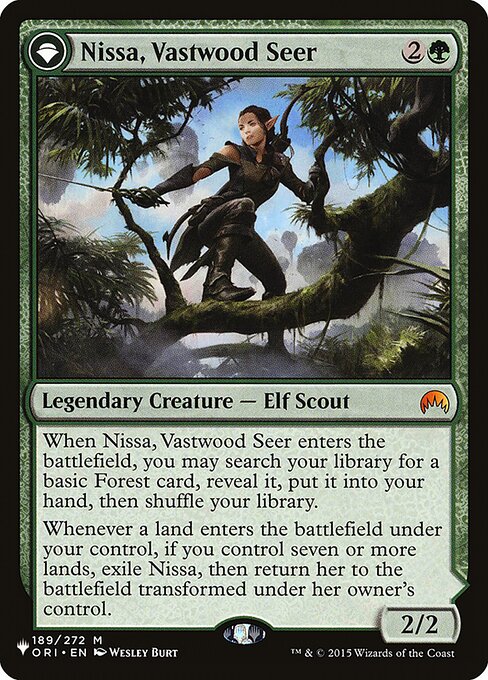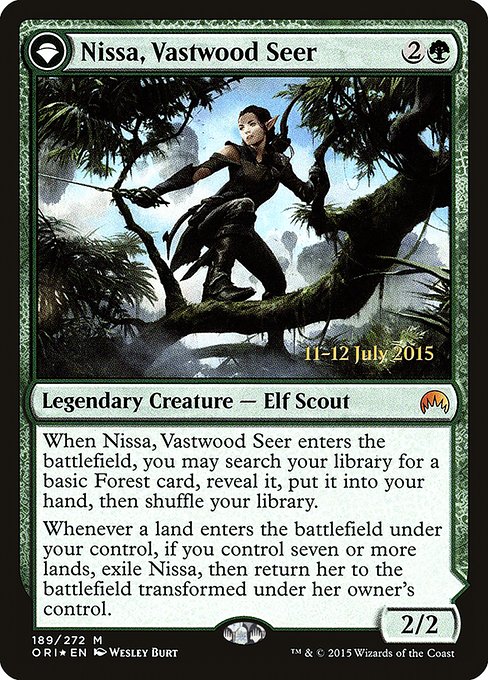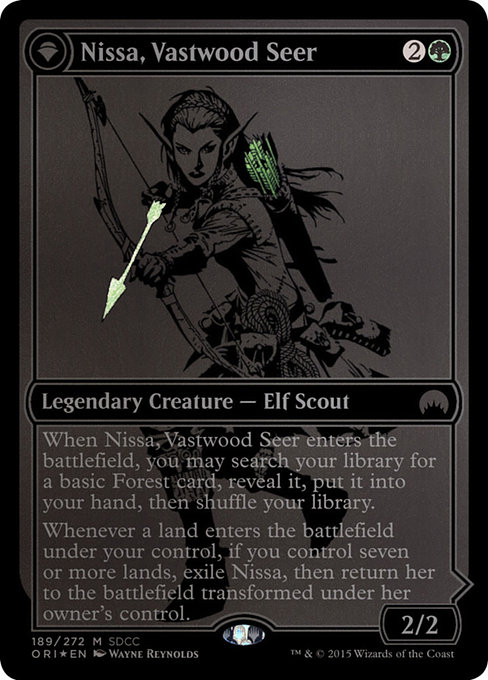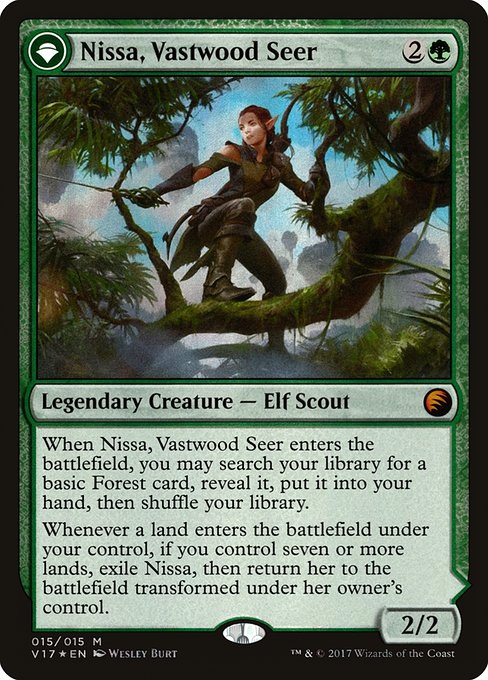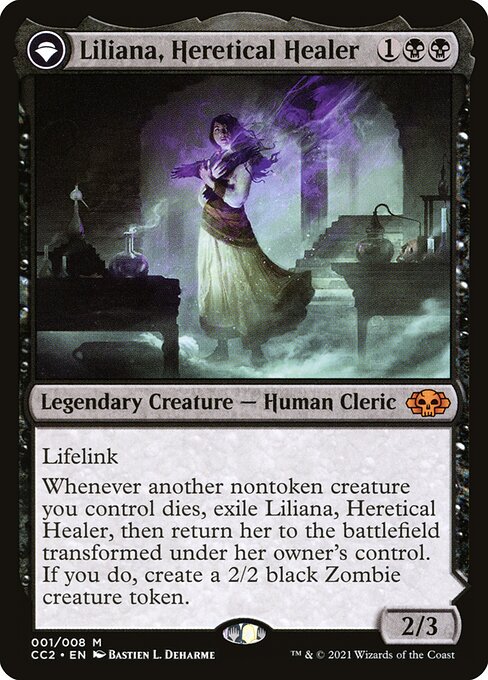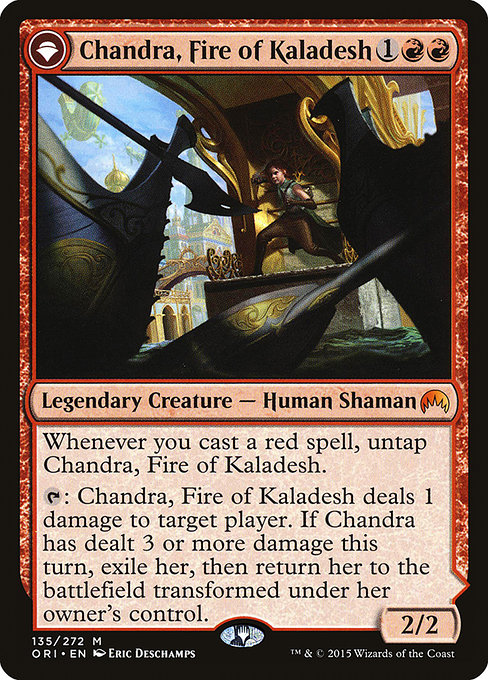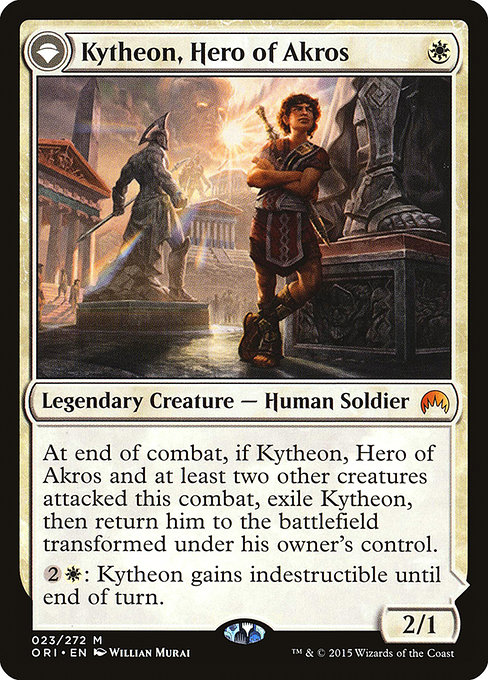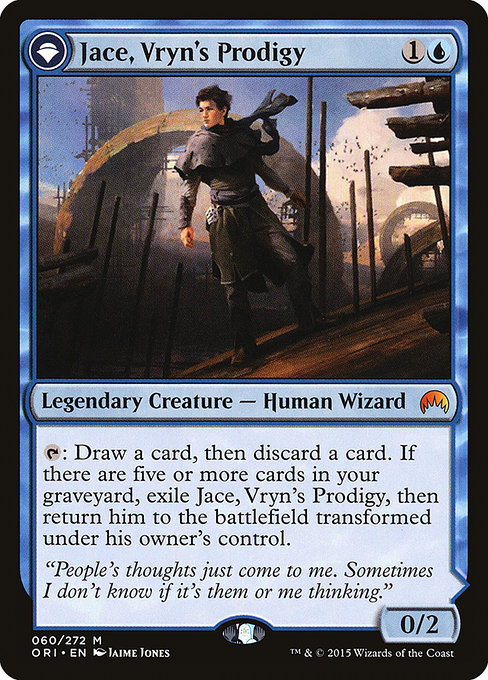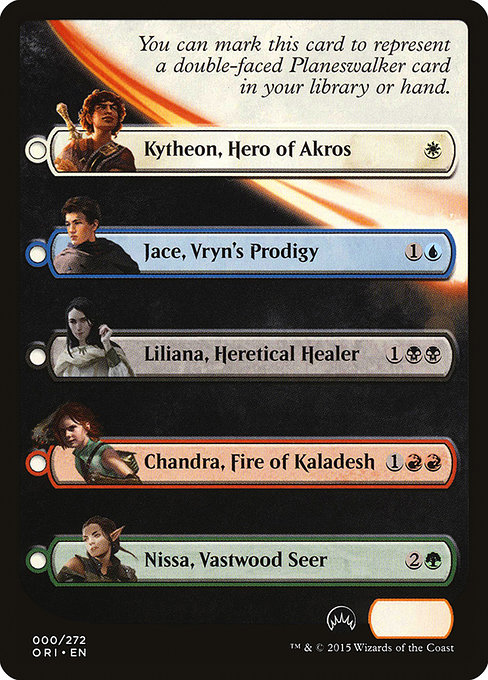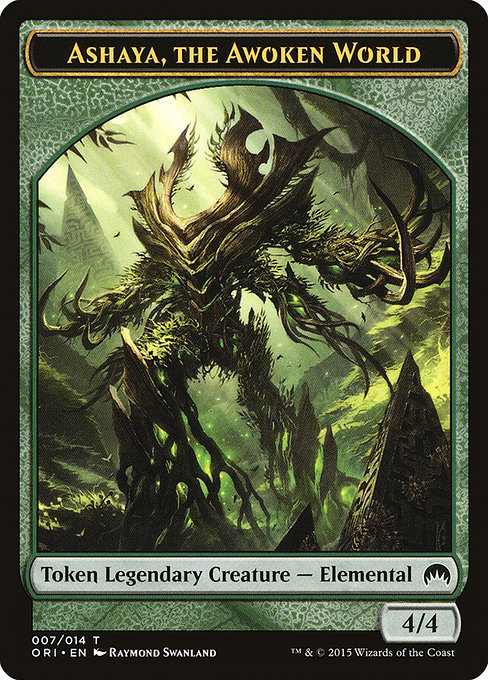Nissa, Vastwood Seer // Nissa, Sage Animist
//
Legendary Creature — Elf Scout // Legendary Planeswalker — Nissa
When Nissa, Vastwood Seer enters the battlefield, you may search your library for a basic Forest card, reveal it, put it into your hand, then shuffle.
Whenever a land enters the battlefield under your control, if you control seven or more lands, exile Nissa, then return her to the battlefield transformed under her owner's control. // +1: Reveal the top card of your library. If it's a land card, put it onto the battlefield. Otherwise, put it into your hand.
−2: Create Ashaya, the Awoken World, a legendary 4/4 green Elemental creature token.
−7: Untap up to six target lands. They become 6/6 Elemental creatures. They're still lands.
Whenever a land enters the battlefield under your control, if you control seven or more lands, exile Nissa, then return her to the battlefield transformed under her owner's control. // +1: Reveal the top card of your library. If it's a land card, put it onto the battlefield. Otherwise, put it into your hand.
−2: Create Ashaya, the Awoken World, a legendary 4/4 green Elemental creature token.
−7: Untap up to six target lands. They become 6/6 Elemental creatures. They're still lands.
2/2
standard
future
historic
gladiator
pioneer
explorer
modern
legacy
pauper
vintage
penny
commander
brawl
alchemy
paupercommander
duel
oldschool
premodern
Rulings
If a double-faced card is manifested, it will be put onto the battlefield face down (this is also true if it’s put onto the battlefield face down some other way). Note that “face down” is not synonymous with “with its back face up.” A manifested double-faced card is a 2/2 creature with no name, mana cost, creature types, or abilities. While face down, it can’t transform. If the front face of a manifested double-faced card is a creature card, you can turn it face up by paying its mana cost. If you do, its front face will be up. A double-faced card on the battlefield can’t be turned face down.
The back face of a double-faced card (in the case of Magic Origins, the planeswalker face) can’t be cast.
If a land becomes a creature but hasn’t continuously been under its controller’s control since that player’s most recent turn began, it won’t be able to attack and its abilities with in the cost (including mana abilities) won’t be able to be activated. In other words, look at how long the permanent itself has been under your control, not how long it’s been a creature.
You can activate one of the planeswalker’s loyalty abilities the turn it enters the battlefield. However, you may do so only during one of your main phases when the stack is empty. For example, if the planeswalker enters the battlefield during combat, there will be an opportunity for your opponent to remove it before you can activate one of its abilities.
Nissa, Vastwood Seer is exiled as a result of her second triggered ability. If she enters the battlefield while you control seven or more lands, she won’t automatically be exiled and transform.
You can activate Nissa, Sage Animist’s second ability even if you already control an Ashaya, the Awoken World. Just after the second token is created, you’ll choose one to remain on the battlefield. The other will be put into your graveyard and subsequently cease to exist.
In some rare cases, a spell or ability may cause one of these five cards to transform while it’s a creature (front face up) on the battlefield. If this happens, the resulting planeswalker won’t have any loyalty counters on it and will subsequently be put into its owner’s graveyard.
The converted mana cost of a double-faced card not on the battlefield is the converted mana cost of its front face.
A Magic Origins planeswalker that enters the battlefield because of the ability of its front face will enter with loyalty counters as normal.
A double-faced card enters the battlefield with its front face up by default, unless a spell or ability instructs you to put it onto the battlefield transformed, in which case it enters with its back face up.
Each face of a double-faced card has its own set of characteristics: name, types, subtypes, power and toughness, loyalty, abilities, and so on. While a double-faced card is on the battlefield, consider only the characteristics of the face that’s currently up. The other set of characteristics is ignored. While a double-faced card isn’t on the battlefield, consider only the characteristics of its front face.
The back face of a double-faced card doesn’t have a mana cost. A double-faced permanent with its back face up has a converted mana cost equal to the converted mana cost of its front face. Each back face has a color indicator that defines its color.
For more information on double-faced cards, see the Shadows over Innistrad mechanics article (http://magic.wizards.com/en/articles/archive/feature/shadows-over-innistrad-mechanics).
You can control two of this permanent, one front-face up and the other back-face up, at the same time.
The back face of a double-faced card (in the case of Magic Origins, the planeswalker face) can’t be cast.
If a land becomes a creature but hasn’t continuously been under its controller’s control since that player’s most recent turn began, it won’t be able to attack and its abilities with in the cost (including mana abilities) won’t be able to be activated. In other words, look at how long the permanent itself has been under your control, not how long it’s been a creature.
You can activate one of the planeswalker’s loyalty abilities the turn it enters the battlefield. However, you may do so only during one of your main phases when the stack is empty. For example, if the planeswalker enters the battlefield during combat, there will be an opportunity for your opponent to remove it before you can activate one of its abilities.
Nissa, Vastwood Seer is exiled as a result of her second triggered ability. If she enters the battlefield while you control seven or more lands, she won’t automatically be exiled and transform.
You can activate Nissa, Sage Animist’s second ability even if you already control an Ashaya, the Awoken World. Just after the second token is created, you’ll choose one to remain on the battlefield. The other will be put into your graveyard and subsequently cease to exist.
In some rare cases, a spell or ability may cause one of these five cards to transform while it’s a creature (front face up) on the battlefield. If this happens, the resulting planeswalker won’t have any loyalty counters on it and will subsequently be put into its owner’s graveyard.
The converted mana cost of a double-faced card not on the battlefield is the converted mana cost of its front face.
A Magic Origins planeswalker that enters the battlefield because of the ability of its front face will enter with loyalty counters as normal.
A double-faced card enters the battlefield with its front face up by default, unless a spell or ability instructs you to put it onto the battlefield transformed, in which case it enters with its back face up.
Each face of a double-faced card has its own set of characteristics: name, types, subtypes, power and toughness, loyalty, abilities, and so on. While a double-faced card is on the battlefield, consider only the characteristics of the face that’s currently up. The other set of characteristics is ignored. While a double-faced card isn’t on the battlefield, consider only the characteristics of its front face.
The back face of a double-faced card doesn’t have a mana cost. A double-faced permanent with its back face up has a converted mana cost equal to the converted mana cost of its front face. Each back face has a color indicator that defines its color.
For more information on double-faced cards, see the Shadows over Innistrad mechanics article (http://magic.wizards.com/en/articles/archive/feature/shadows-over-innistrad-mechanics).
You can control two of this permanent, one front-face up and the other back-face up, at the same time.
Rulings
If a double-faced card is manifested, it will be put onto the battlefield face down (this is also true if it’s put onto the battlefield face down some other way). Note that “face down” is not synonymous with “with its back face up.” A manifested double-faced card is a 2/2 creature with no name, mana cost, creature types, or abilities. While face down, it can’t transform. If the front face of a manifested double-faced card is a creature card, you can turn it face up by paying its mana cost. If you do, its front face will be up. A double-faced card on the battlefield can’t be turned face down.
The back face of a double-faced card (in the case of Magic Origins, the planeswalker face) can’t be cast.
If a land becomes a creature but hasn’t continuously been under its controller’s control since that player’s most recent turn began, it won’t be able to attack and its abilities with in the cost (including mana abilities) won’t be able to be activated. In other words, look at how long the permanent itself has been under your control, not how long it’s been a creature.
You can activate one of the planeswalker’s loyalty abilities the turn it enters the battlefield. However, you may do so only during one of your main phases when the stack is empty. For example, if the planeswalker enters the battlefield during combat, there will be an opportunity for your opponent to remove it before you can activate one of its abilities.
Nissa, Vastwood Seer is exiled as a result of her second triggered ability. If she enters the battlefield while you control seven or more lands, she won’t automatically be exiled and transform.
You can activate Nissa, Sage Animist’s second ability even if you already control an Ashaya, the Awoken World. Just after the second token is created, you’ll choose one to remain on the battlefield. The other will be put into your graveyard and subsequently cease to exist.
In some rare cases, a spell or ability may cause one of these five cards to transform while it’s a creature (front face up) on the battlefield. If this happens, the resulting planeswalker won’t have any loyalty counters on it and will subsequently be put into its owner’s graveyard.
The converted mana cost of a double-faced card not on the battlefield is the converted mana cost of its front face.
A Magic Origins planeswalker that enters the battlefield because of the ability of its front face will enter with loyalty counters as normal.
A double-faced card enters the battlefield with its front face up by default, unless a spell or ability instructs you to put it onto the battlefield transformed, in which case it enters with its back face up.
Each face of a double-faced card has its own set of characteristics: name, types, subtypes, power and toughness, loyalty, abilities, and so on. While a double-faced card is on the battlefield, consider only the characteristics of the face that’s currently up. The other set of characteristics is ignored. While a double-faced card isn’t on the battlefield, consider only the characteristics of its front face.
The back face of a double-faced card doesn’t have a mana cost. A double-faced permanent with its back face up has a converted mana cost equal to the converted mana cost of its front face. Each back face has a color indicator that defines its color.
For more information on double-faced cards, see the Shadows over Innistrad mechanics article (http://magic.wizards.com/en/articles/archive/feature/shadows-over-innistrad-mechanics).
You can control two of this permanent, one front-face up and the other back-face up, at the same time.
The back face of a double-faced card (in the case of Magic Origins, the planeswalker face) can’t be cast.
If a land becomes a creature but hasn’t continuously been under its controller’s control since that player’s most recent turn began, it won’t be able to attack and its abilities with in the cost (including mana abilities) won’t be able to be activated. In other words, look at how long the permanent itself has been under your control, not how long it’s been a creature.
You can activate one of the planeswalker’s loyalty abilities the turn it enters the battlefield. However, you may do so only during one of your main phases when the stack is empty. For example, if the planeswalker enters the battlefield during combat, there will be an opportunity for your opponent to remove it before you can activate one of its abilities.
Nissa, Vastwood Seer is exiled as a result of her second triggered ability. If she enters the battlefield while you control seven or more lands, she won’t automatically be exiled and transform.
You can activate Nissa, Sage Animist’s second ability even if you already control an Ashaya, the Awoken World. Just after the second token is created, you’ll choose one to remain on the battlefield. The other will be put into your graveyard and subsequently cease to exist.
In some rare cases, a spell or ability may cause one of these five cards to transform while it’s a creature (front face up) on the battlefield. If this happens, the resulting planeswalker won’t have any loyalty counters on it and will subsequently be put into its owner’s graveyard.
The converted mana cost of a double-faced card not on the battlefield is the converted mana cost of its front face.
A Magic Origins planeswalker that enters the battlefield because of the ability of its front face will enter with loyalty counters as normal.
A double-faced card enters the battlefield with its front face up by default, unless a spell or ability instructs you to put it onto the battlefield transformed, in which case it enters with its back face up.
Each face of a double-faced card has its own set of characteristics: name, types, subtypes, power and toughness, loyalty, abilities, and so on. While a double-faced card is on the battlefield, consider only the characteristics of the face that’s currently up. The other set of characteristics is ignored. While a double-faced card isn’t on the battlefield, consider only the characteristics of its front face.
The back face of a double-faced card doesn’t have a mana cost. A double-faced permanent with its back face up has a converted mana cost equal to the converted mana cost of its front face. Each back face has a color indicator that defines its color.
For more information on double-faced cards, see the Shadows over Innistrad mechanics article (http://magic.wizards.com/en/articles/archive/feature/shadows-over-innistrad-mechanics).
You can control two of this permanent, one front-face up and the other back-face up, at the same time.
Your collection? Your decks?
Want to manage your collection and/or create decks?
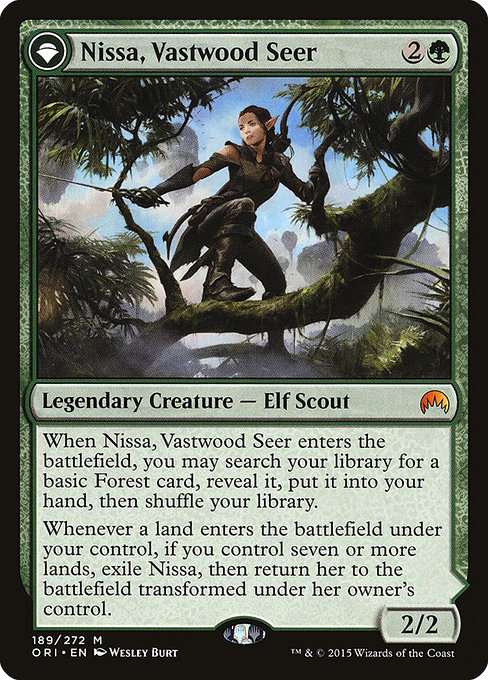

 0
0
 4.08€
4.08€
